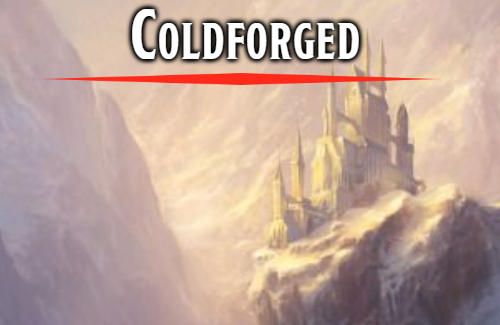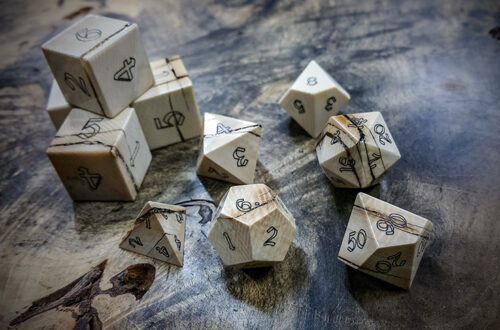Monday Mythology: Lobos, God of Time
Before I get started, I wanted to say a few things about the last four gods I am going to write about. These gods: Drakken, Telaxus, Marija and Lobos are each unique, even to the pantheon, and represent either a concept that is unique, or events that transpired due to my players actions in the campaigns I have run. Each of them is going to get a short overview before I launch into the details and try to describe them.
Lobos, the God of Time, is an anomaly in the pantheon in that he is not, truly part of it the way others are. Lobos simply appeared one day, before the Godswar, and spoke his name and title, Lobos, Lord of the Inevitable. He came from beyond time itself, and spoke of residing among them, not as one of the, but of one of them. His demeanor brooked no argument, and his bearing no retort. Since that time he has fought, bleed and supported the Paltonarchs against first the rebels and then the Accursed. There are none among the paltonarchs who would say they know him well, for he has always kept his distance. Aloof and distant from even his fellows, Lobos is an enigma to all.
Lobos, God of Time
Other Titles: The Ineveitable One, The Unending, Outsider, Castellan of Nothingness
Alignment: NE
Weapon: Scythe (Domaragon – “The End of Ages”)
Major Domains: Time, Inevitability, Fate
Minor Domains: Destruction, Aging, Void
Totem Animal/Warform: Frogs (The warform is that of a black, starfilled frog with vast teeth of solidified nothingness, with eyes that see through time in all directions)
Holy Symbol: An hourglass with black sand flowing up instead of down.
Favored Appearances: Lobos, not one to stick with forms and conventions, has a single androgynous form that he uses in every interaction. He is of average height, around 5’8″ and of slender build. He has an extremely angular face, with almond shaped eyes that are completely black. Thin lips, a sharp nose and a high forehead complete the image. He keeps his long, grey-blue hair in a ponytail which often rests over his shoulder and onto his chest. He is neither muscular nor lean, though his pale grey skin often has him perceived as thinner than he is. He is never without his scythe, the great weapon that will destroy time itself at the end of days. Other than that single weapon, however, he is without personal protection or weaponry, wearing instead a peasants clothes of trousers and shirt, with an over-tunic of dark gray, hood pulled over his head to shadow his face.
Personality: Lobos is a loner, keeping his own company and preferring it that way over any. Only his followers and devoted aren’t sent away on their arrival to the Gates of Time. Few Gods, if any, are able to attend him and be welcomed among his small host. Lobos seems often distracted, his mind of in other dimensions and times, seeing both what was, what will be, and what could have been. However, once his mind is fixated on a topic or event, he becomes singularly focused, able to see with great clarity the outcome and how swiftly he can bring it about.
Teachings: There is little joy in the passing of time, and even that little bit is not celebrated by the adherents of Lobos. It is taught that all things pass into oblivion, given enough time, and that the end of all things is the fate of the world. To fight and resist that fate, that great darkness and the void beyond even the war in the Iron Marches, is folly. All things must pass through time, and all things must one day end. Lobos will be there to greet them. The only ending, the only finale, the only way out, is complete, utter and consuming annihilation.
Abode: Even among the gods, Lobos is solitary and prefers the company of himself to that of others. The Gates of Time lie the farthest back on the Paltonarch controlled side of the marches, near the western Unknown Reaches. There, it is said that he sits and contemplates the end of the world and time itself unless called upon by the other gods for aid.
Clergy: The priests and followers of Lobos are responsible for little among the civilized lands of the world, though often in the more savage areas he is revered as a second death god, next to Dagor. Temples of lobos provide no succor to the weak, the infirm or the injured, and provide no asylum or refuge for the poor and weak. Instead, they are warrior-monks, preparing their bodies and their minds for the end times. They train their minds, bodies and souls for that moment that they are pulled away, called to fight the the Last War with Lobos at the head of an army of devoted and fearless warriors. None of his warriors have ever been seen on the Iron Marchs, and it is said that He and all his followers fight a Hidden War against unknown beings of immense power. Though Lobos has seen the end, the failure of the Last War, the Gods and his devotees, he knows it is the only thing that can be done.
Knightly Order:It could be said that all of Lobos followers are a knightly order, but even among those dedicated to a cause, there are those more dedicated. The Knights of Times Eye are those fanatics. armored in dark gray and wielding great scythes of unspeakable power, they seek not to hone their bodies and minds in the rigors of a monastery or a church, but hunting those who would defy the end of time. In a similar vein to the priests of Dagor, the Knights of the Eye hate the undead, but they also hunt those who have defied time in other ways. Immortals, demons, dragons. Beings that simply live for seeming eternities. The Knights of the Eye seek them out and strive to destroy them, both as an act of devotion and as a test to their skills and prowess.
Clerical Attire: Lobos prefers neutral grays and blacks, with the rare white as an accent. Many of his agents sport a hood or color, and a white hood has become a well known symbol of the followers of this faith. Preference is not given for either robes, clothes or any other fashion, though often it is armor that has a need to be dyed, lacquered or other form of stained to denote the faith.
Followers: Few Elves take of the worship of one who hates immortal beings, though some have found their self loathing to be a great fuel for his faith. Warriors and Monks tend to gravitate to following Lobos, though few others do. Mages, sometimes, but only for as long as they can naturally live.

